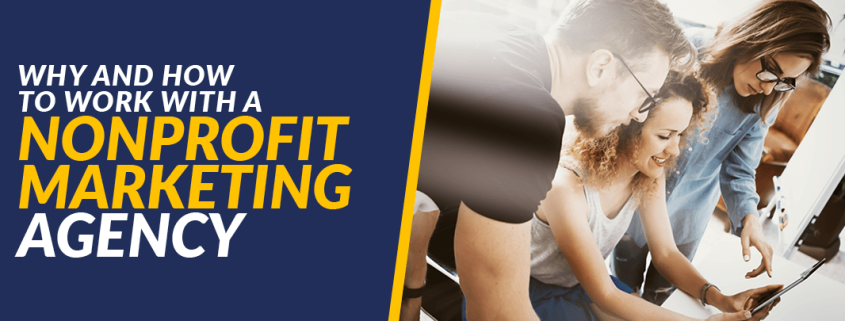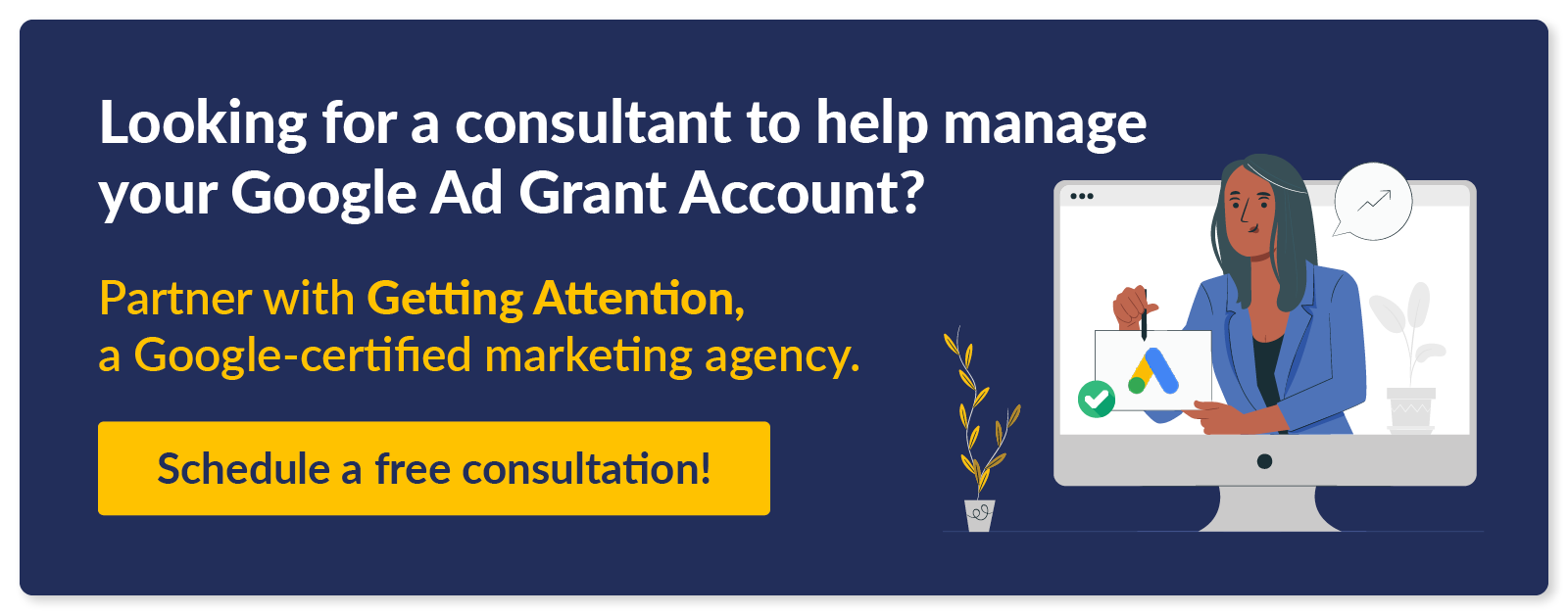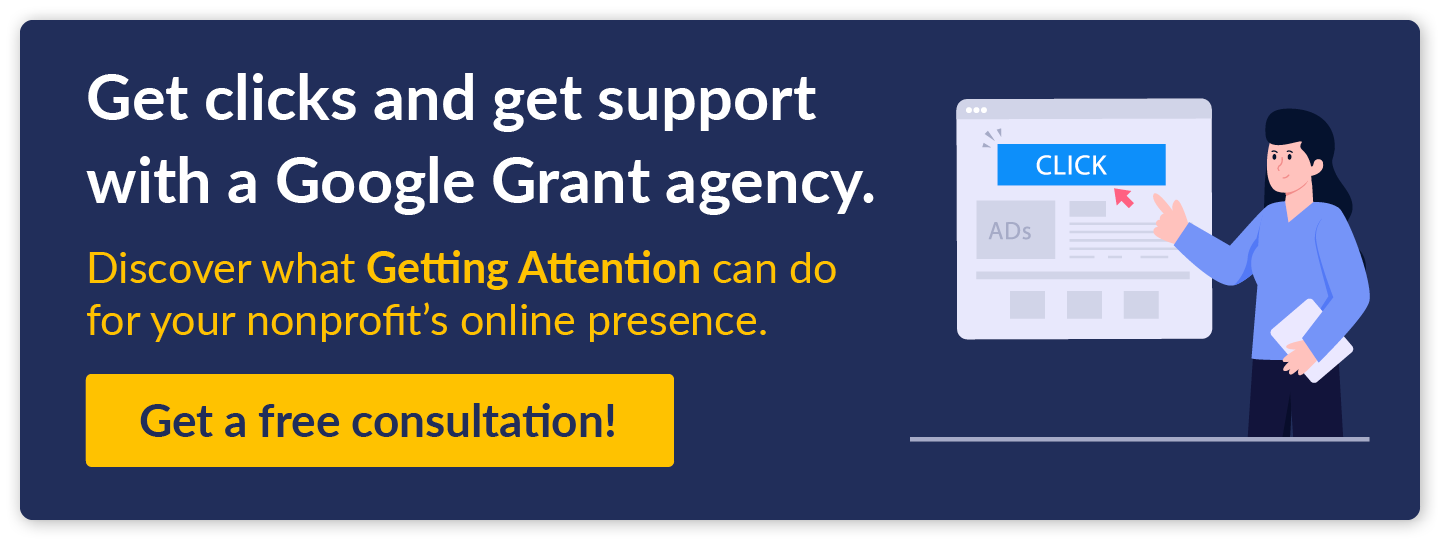Why and How to Work with a Nonprofit Marketing Agency
From raising funds and spreading awareness to informing beneficiaries about your services, marketing is essential to helping your nonprofit fulfill its mission. However, knowing how to market your cause, what platforms to use, and if your marketing strategy is effective requires expertise your nonprofit’s team might not have.
Fortunately, nonprofit marketing agencies are in large supply. These professionals bring their years of expertise working with nonprofits to supercharge their clients’ current marketing efforts, brainstorm new strategies, and provide long-term support.
To help your nonprofit understand if now is the right time to partner with a nonprofit marketing agency, this guide will answer basic questions about these professionals and review core types of marketing agencies.
What is a nonprofit marketing agency?
A nonprofit marketing agency is a publicity and fundraising consulting firm that works with charitable organizations. These organizations work specifically with nonprofits and provide a variety of services, such as:
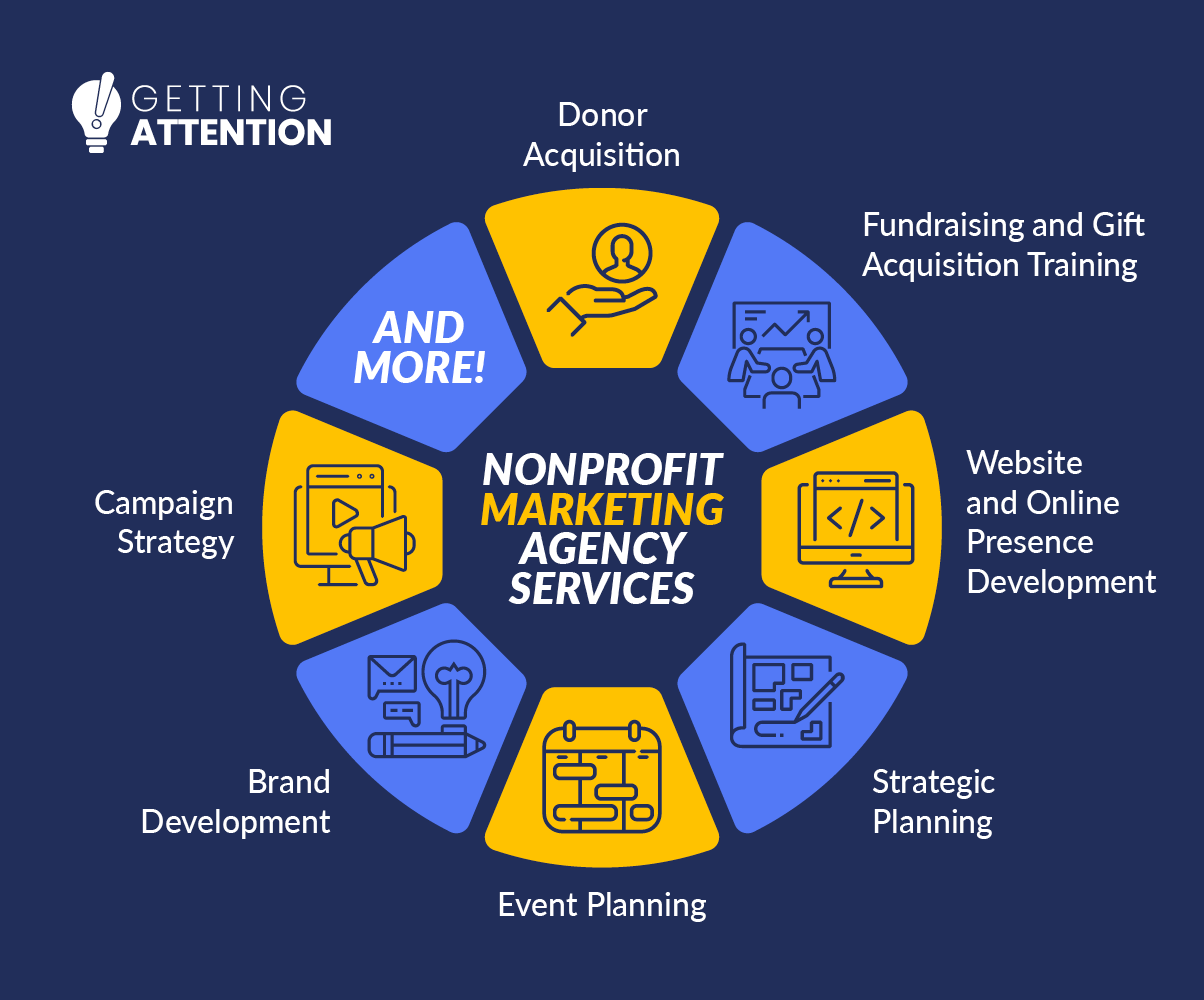
- Donor acquisition
- Fundraising and gift acquisition training
- Website and online presence development
- Strategic planning
- Event planning
- Brand development
- Campaign strategy
- And more
To sum up, if you need help reaching out to your donors, a marketing consultant can help.
Some nonprofit marketing firms are full-service agencies, whereas others specialize in specific areas. Whether your organization should partner with a full-service or specialized nonprofit marketing firm depends on both your immediate and long-term needs. For example, many full-service agencies become long-term partners that provide their clients with general marketing assistance for years.
However, full-service agencies often lack specialized expertise, such as knowledge of how to run an effective Google Ad Grants account. As such, if your nonprofit needs help writing ads or getting your Ad Grants account reactivated, you’re likely better off working with a specialized Google Ad Grants nonprofit marketing agency.
Should my nonprofit work with a marketing agency?
Nonprofit budgets are often tight, especially when it comes to non-mission-related expenses like marketing. While nonprofit marketing agencies offer prices that accommodate charitable organizations, they are still an expense you’ll need to weigh the pros and cons of paying.
For some nonprofits, the results of working with a marketing agency will more than pay for itself, while others may not receive maximum benefits in their current state. A few situations where you can benefit from a marketing agency include when your nonprofit:
- Tries a new marketing strategy. If your nonprofit is new to marketing or looking to try a new marketing strategy, it can be worthwhile to partner with an external agency that has experience with that strategy. For example, if you want to add a direct mail element to your multichannel marketing strategy, you may want to reach out to an agency with expertise in traditional mail fundraising.
- Needs help improving marketing results. If your nonprofit already has a marketing team and strategy but isn’t seeing the results you would like, insight from an objective third party can be useful. However, when approaching a marketing agency, your nonprofit should present a specific problem or project you need assistance with rather than asking for help in general. This approach gives the agency the guidance needed to tailor their recommendations and ensures the collaboration has a clear, measurable goal.
- Has the budget for a consultant. Nonprofit marketing agencies are mindful of their clients’ budgets, but they don’t work for free. When assessing agencies, look at their prices and what level of service is offered at each price. You’ll get what you pay for, so consider what level of relationship you want with any agency you consider.
Additionally, before approaching a marketing agency for nonprofits, you should know what kind of support you’re looking for. Do you need a short-term partner for a specific fundraiser, or are you looking for third-party services that will act as a permanent extension of your team?
The answer to this question will depend on several factors, such as the type of agency you need.
Types of Nonprofit Marketing Agencies
Nonprofit marketing is a complex, multi-faceted topic, and there are agencies that specialize in different fields, strategies, and nonprofit types. To provide a general overview of nonprofit agencies, we’ll explore five core kinds of agencies and provide our top recommendation for each one.
Google Ad Grant
The Google Ad Grant is a corporate social responsibility program run by Google that allows nonprofits to buy ad space on Google search results pages for free. With this resource, nonprofits can expand their reach without needing to dip into funds allocated for other projects.
Google Ad Grant agencies help nonprofits manage every aspect of this unique marketing opportunity, including:
- Applying for the Google Ad Grant
- Creating and managing their ad accounts
- Maintaining compliance and reinstating suspended accounts
Consultants bring specialized expertise related to keyword research, search engine optimization, and Google policies. As Google Ad Grant management and Google Ads are fairly unique even compared to other digital marketing channels, nonprofits that need assistance should seek out consultants that are specifically Google Ad Grant agencies.
Our Favorite Google Ad Grant Agency: Getting Attention
We, of course, have to recommend our own nonprofit marketing firm: Getting Attention.
As a Google-certified partner, our team has extensive knowledge of the Google Ad Grant regulations and stays up to date on the latest developments from Google’s team. This means our experts can make sure your account is always in line with the latest trends, compliant with Google policies, and set to make the most of your allotted monthly funds.
When it comes to marketing, our services include:
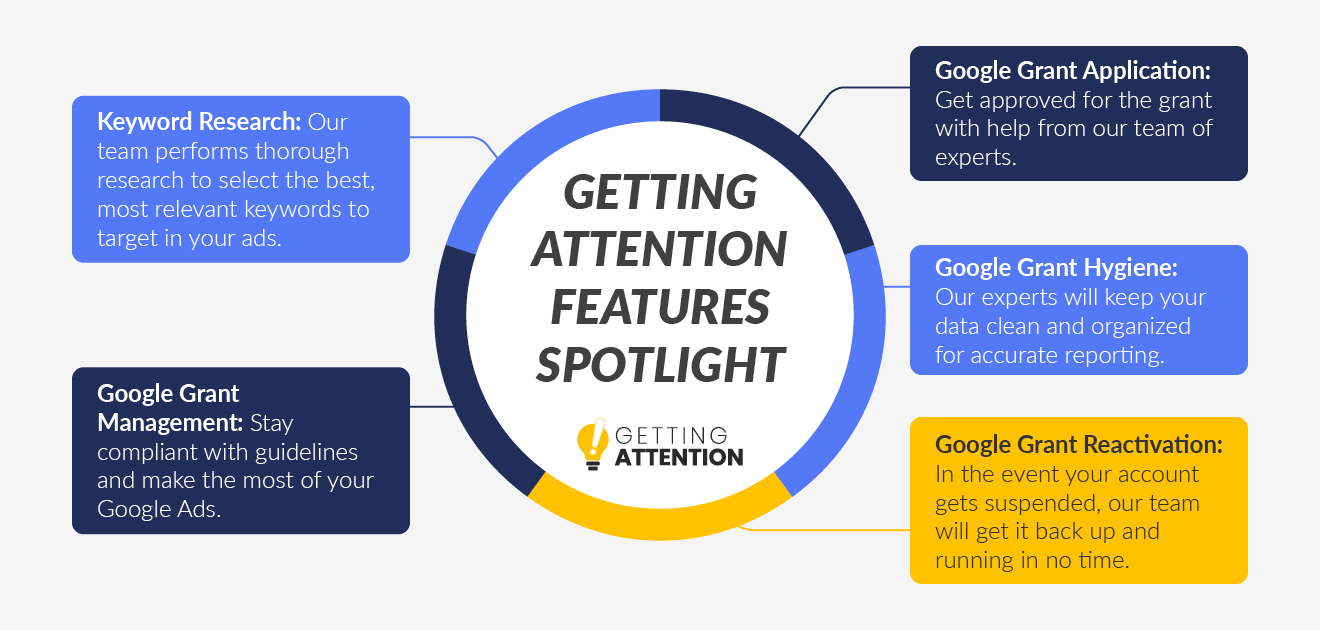
- Keyword research
- Google Grant management
- Google Grant application
- Data hygiene upkeep
- Account reactivation
Interested in Getting Attention is the right nonprofit marketing agency for you? Request a free consultation with our team!
Technology
Technology is a core part of many nonprofit’s marketing efforts. After all, basic nonprofit marketing tools like your CRM and email platform are complex software solutions that need to be implemented, cleaned, optimized, updated, and integrated with additional tools to maximize their functionality.
Some marketing strategies also revolve around technical solutions. For example, nonprofits interested in running complex virtual events, creating interactive websites, or collecting granular donor data can all benefit from working with a nonprofit technology consultant.
Our Favorite Technology Agency: DNL OmniMedia
For nonprofits that use CRMs and other tools created by top vendors Blackbaud and Salesforce, we have to recommend DNL OmniMedia as our number one nonprofit technology agency.
DNL OmniMedia not only advises nonprofits on technology-driven marketing strategies but can also implement software solutions, design custom software, and create custom integrations. Their services include:
- CRM implementation. DNL shines when it comes to CRM implementation for Blackbaud and Salesforce products. When working with DNL, nonprofits will receive assistance integrating their software, migrating data, and customizing their platform.
- Website development and ongoing maintenance. From getting your site up and running to creating new features to maintaining its functionality, DNL’s experts can handle every part of your website.
- Custom software products. Team DNL are nonprofit technology experts, especially when it comes to Blackbaud and Salesforce products. As such, they offer a wide range of tools and apps built on these platforms that can help nonprofits improve their websites. Additionally, Team DNL can build fully customized solutions for clients to meet their specific needs.
DNL OmniMedia is ready to be a long-term partner to its clients. Along with ongoing maintenance and support, Team DNL also offers multiple training sessions for nonprofits each year to get new team members up to speed with its latest technology.
Branding
Your nonprofit’s brand is essentially how your organization communicates with your audience. A strong brand identity will make supporters see your nonprofit as a coherent, professional, and trustworthy organization worth supporting.
Branding consists of multiple elements nonprofits may need a consultant’s help with, including:
- Brand strategizing and planning
- Logo and other graphic assets creation
- Website creation
If your nonprofit already has a brand identity, a consultant can help refine your approach and create new assets to expand and solidify your brand. These nonprofits should primarily look at agencies that focus on graphic design and website development.
Nonprofits that lack a clear brand or are looking to rebrand can partner with marketing agencies that will help brainstorm and build a new brand identity from the ground up. These agencies are also graphic designers but provide additional services related to strategic marketing planning, focus group testing, and brand rollout.
Our Favorite Branding Agency: Loop
No matter where your nonprofit currently stands with its brand identity, Loop is our go-to recommendation. Loop aims to provide its clients with strategic guidance for every part of their brand identity.
When working with Loop, nonprofits will have a nonprofit marketing agency that’s ready to walk them through a four-step process for creating and rolling out a successful brand identity:
- Discovery. Instead of blindly creating new brand materials, Loop will engage your community and staff in authentic conversations about your organization, its services, and its values.
- Conception. Loop uses the information collected in the discovery phase to create concepts for logos, color palettes, typography, and other graphic design elements.
- Guide creation. With assets chosen, Loop will compose a brand guide that your nonprofit can use to establish how it will use various elements of its brand.
- Implementation. To roll out your new brand, Loop will create a strategic communication plan for announcing your brand and updating external communication to reflect it.
Loop is ready to be a long-term partner for its nonprofit clients. Their general timeline for brand-related partnerships consists of a three-month period for initial brand activities, followed by ongoing support for brand rollout which can last as long as the nonprofit needs.
Digital Fundraising
Modern nonprofit marketing strategies focus heavily on digital fundraising. As a result, digital marketing varies widely and consists of a number of services an agency might offer, such as:
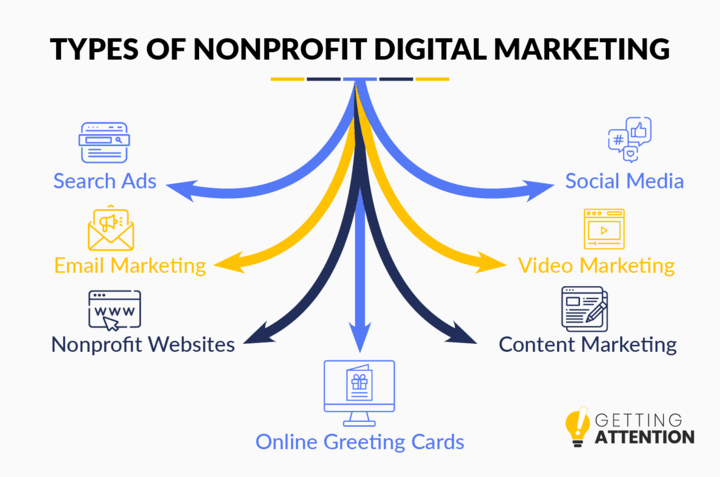
- Search ads
- Email marketing
- Content marketing
- Website user experience optimization
- Social media marketing
- Video marketing
- Online greeting cards
Most nonprofit marketing agencies have at least some focus on digital marketing channels as a result. However, some agencies have more expertise and specialty services than others. When assessing digital fundraising consultants, explore their portfolios and case studies of past clients to see what kinds of work and projects they specialize in.
Our Favorite Digital Fundraising Agency: Fifty & Fifty
Fifty & Fifty is a full-service digital marketing agency for nonprofits that can help your team with nearly any component of digital fundraising, making it our top pick.
When it comes to marketing, Fifty & Fifty helps nonprofits with the following:
- Campaigns
- Social media
- Search engine optimization
- User experience optimization
- Analytics and reporting
But Fifty & Fifty’s services don’t end there. For more advanced digital fundraising campaigns, Fifty & Fifty offers:
- Website development
- Landing page optimization
- Microsite creation
- Web application development
With this wide range of options, Fifty & Fifty is ideal for nonprofits interested in working with an agency for almost any aspect of digital fundraising.
Capital Campaigns
Capital campaigns are unique fundraising campaigns that require specialized marketing and consulting services. These campaigns are meant to accumulate a large amount of capital for a major project, such as constructing a new building or launching a brand new initiative.
While a regular fundraising campaign falling short of its goal is disappointing, a failed capital campaign can be a serious blow to your nonprofit’s reputation and ability to run future fundraisers. As such, seeking third-party assistance from professional agencies is a standard part of running a capital campaign.
Our Favorite Captial Campaigns Agency: Donorly
Donorly is the go-to agency for nonprofits running their first capital campaign. If your nonprofit’s team lacks experience with capital campaigns, Donorly is here to guide you every step of the way with the following services:
- Leadership and fundraising training
- Three-month intensive training and strategic planning
- Campaign kick-off assistance
Additionally, if your nonprofit lacks the resources to run your capital campaign, Donorly’s team can act as an extension of your team. Think of the Donorly team as temporary members of your staff rather than an external service!
How to Hire a Nonprofit Marketing Agency: 5 Steps
With knowledge of what types of agencies are out there, your nonprofit is ready to assess whether you should partner with a marketing agency and learn how to start that partnership.
In most cases, this follows a five-step process:
1. Understand your needs.
Before beginning the hiring process, determine whether your nonprofit needs to partner with a marketing agency and how that agency would help you if you did. Even if you are fairly certain that working with an external nonprofit marketing firm is the right move, this process still provides useful direction when you hire a consultant.
To assess your nonprofit’s marketing needs, follow these steps:
- Assess metrics. How are your nonprofit’s current marketing efforts performing? Use your CRM, website analytics, email platform, and social media profiles to analyze core metrics related to outreach and donor engagement. Specifically, look at metrics such as donor acquisition, recurring giving rates, donor lapse, and donor engagement.
- Speak with various team members. The more perspectives you have on your nonprofit’s current marketing strategy, the more accurate your internal assessment will be. While your marketing team will likely provide the most insight, consult with team members in other related departments, such as technology and donor cultivation. This allows you to get a broader view of your current strategies and how your organization as a whole feels about them.
- Consider your goals. You should approach nonprofit marketing agencies with specific goals in mind. These might include increasing your donor acquisition rate by a certain percentage or implementing an entirely new marketing strategy.
- Assess your current marketing technology stack. Look at all of the solutions your nonprofit has at its disposal for outreach activities. What function does each tool offer? Is there any overlap between solutions? When working with a marketing consultant, you may need to consolidate your technology stack or invest in new tools to expand your team’s abilities and reach.
Along with helping to decide whether you need to work with an agency and what kind, this step also involves compiling information about your nonprofit an agency will likely need. By having information about your current strategies, technology, and marketing concerns ready, you save your consultant the time they would otherwise need to spend collecting it.
2. Research agencies.
Once you know what services you need from a nonprofit marketing agency, you can research consulting firms. Basic Google searches should bring up recommended provider pages and reviews, but we also recommend these additional research best practices:
- Ask for recommendations. If your nonprofit has connections to other organizations and leaders in your field, reach out to them for recommendations. They can offer firsthand accounts of their experiences working with various agencies or point your nonprofit toward agencies they’ve heard positive things about.
- Explore past clients. When assessing a potential agency, check if they have a portfolio of past work available on their website. Many consultants will provide case studies of successful clients. These can give insight into the types of projects the agency typically works on, and your nonprofit can assess if similar solutions to the ones described in the portfolio would work for you.
- Look at credentials. Several organizations provide awards and certifications for nonprofit consulting agencies. For example, many agencies offer Google Ad Grant services, but not all are Google-certified.
During this process, assemble a list of potential agencies to reach out to. Research reviews and past projects to narrow down this list to a handful you are serious about potentially working with.
3. Introduce your nonprofit.
Hiring an agency is not like making a simple purchase, and your nonprofit should never jump straight to a hiring decision before reaching out to and speaking with an agency’s team.
Introduce your nonprofit and get acquainted with your top potential marketing agencies by filling out their contact forms, sending an introductory email, or giving them a call based on what communication channels they have available for new and potential clients.
Your introduction should explain your nonprofit’s mission, share why you are looking for a marketing agency, and invite the agency to tell you more about its services. This is also an opportunity to further your research. Ask agencies about:
- Past clients and if you can even contact some of them to ask them about their experiences with the agency.
- Questions you have about their service model.
- What types of nonprofits the agency typically works with and if they can share past details about past projects they are proud of.
You may also start to establish a rapport with agencies during this step, which will help you assess if they are a good fit for your nonprofit’s working culture and style.
4. Submit a request for proposal.
Once you have a shortlist of agencies you’re interested in working with, you can send out your request for proposal (RFP). This document outlines your nonprofit’s current problems and goals and invites agencies to respond with a proposed solution that they would implement if you hire them.
Some consultants may have specific RFP forms for you to fill out, but for others, you will need to write your RFP from scratch. The general outline of an RFP includes these five elements:
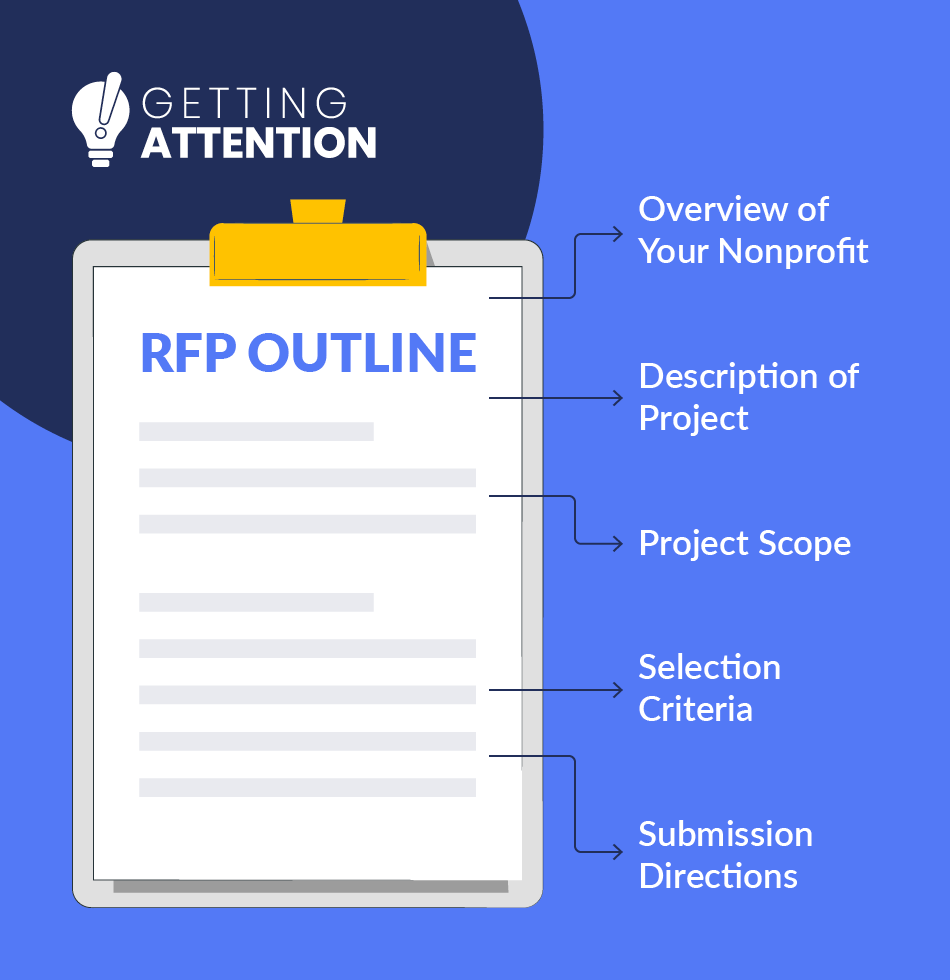
- An overview of your organization. There’s no need to provide a complete retelling of your nonprofit’s history. Instead, focus on background information relevant to your current project and the potential obstacles it’s facing. At the very least, this should include your mission statement and a general overview of your organization’s size and structure.
- Description of your project. Explain what your nonprofit wants the agency to accomplish. Be as specific as possible when explaining your goals and why you want to achieve them. This will provide context that agencies will find useful when crafting their responses.
- Project scope. Share your timeline, budget, relevant resources, and any other factors and limitations consultants should be aware of. For example, if your project involves technology in any capacity, you should explain what your current software setup is.
- Selection criteria. Explain how you will assess responses to your RFP. This might include adherence to the specified scope of your project, how well the agency’s proposal aligns with your goals, and the agency’s overall experience working with nonprofits like yours. If you plan to assess proposals based on multiple factors, explain which are your top priorities and what are nice-to-haves.
- Submission directions. Let agencies know how they should respond to your RFP. This includes how they should format their response, how to send it to you, and when they must send it.
For reference, submitting an RFP is standard procedure for hiring most types of nonprofit consultants outside of just marketing. For example, if you need to hire an HR and compensation consultant, you would also write and submit an RFP.
5. Review responses.
Assemble a team to review agencies’ responses after your submission deadline. This team should consist of leadership members, the head of your marketing team, and any other stakeholders who need to sign off on a hiring decision.
Assess the responses to your RFP according to your stated criteria. Additionally, consider whether each nonprofit marketing firm’s work model would mesh well with your team’s and lead to a successful long-term partnership.
Rank the responses, and contact the top agency to officially hire them for your project. To ensure agencies aren’t left wondering about your decision, add a note in your RFP about when your team expects to contact the chosen consultant.
Nonprofit Marketing Agencies: More Resources
Consultants come in all shapes and sizes, and nonprofit marketing agencies play the vital role of helping nonprofits boost awareness, increase outreach, and experiment with new strategies. To find the agencies that work best for you, assess your marketing needs and how a consultant can help you achieve them.
Marketing is a broad and complex topic. To improve your understanding before working with an agency, explore these resources:
- A Winning Nonprofit Marketing Plan: How to Make People Look. Your nonprofit marketing agency will help you craft a marketing plan. Discover what these plans are and why you need one.
- Promoting Your Mission: 13 Free Nonprofit Marketing Tools. Free marketing tools can help you level up your marketing strategy at no cost. Check out our top recommended tools.
- Nonprofit Awareness Campaigns Guide: Steps, Tips, & Examples. Awareness campaigns rely on continuous and strategic marketing. Learn how to plan and launch one of these campaigns in this guide.
